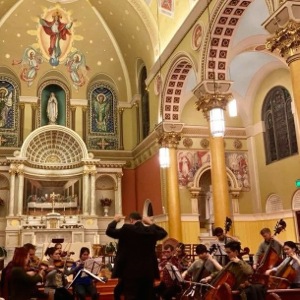
 NCE IN A while I gain insight or discover something that should have been obvious my entire life—so obvious, it is almost embarrassing. But instead, it has taken me nearly five decades to figure it out. I suppose I should get used to this sort of thing.
NCE IN A while I gain insight or discover something that should have been obvious my entire life—so obvious, it is almost embarrassing. But instead, it has taken me nearly five decades to figure it out. I suppose I should get used to this sort of thing.
Musicians are very busy this time of year performing concerts. Much of what I say goes for preparation of the Sacred Liturgy. Concert preparation, especially of sacred music within one’s own parish, school, institution, etc., can be wonderful, and at the same time an added stress. As a Director of Music, one is often responsible for myriad things well beyond the scope of music.
For example, in addition to being a performer, one is also the promoter, contractor, program designer, music librarian, stage manager, building custodian, ad hoc recording engineer, etc. Did I leave anything out? Several items, I am sure.
It’s easy to become completely wrapped up. So much so, that it is a luxury to perform elsewhere in which one can concentrate fully on music.—on being an artist.
This brings me to an essential list of concert preparation. Some obvious, some subtle:
PRACTICE. OBVIOUSLY!
Clearly practice. But how much? That varies for each individual and for the task at hand. But I like to feel fully prepared about three weeks in advance if possible. Additionally, I’ve battled nerves many times in my life, so I make it a priority over prepare. This is not to be confused with risking tendonitis (which I have experienced) or risking one’s mental state.
If I’m conducting, especially an orchestral score, I have taken the advice of Edward Schaefer to mark my score with colored pencils, e.g., different colors for entrances, dynamic, tempo, meter changes, etc. My scores are lit up like a Christmas tree so my eight-year-old son should be able to follow them—and it helps me keep my eyes up.
TAKING CARE OF ONE’S BODY
Preparation that is less musical can have enormous impact on a program. Fatigue is the enemy! One is sleep and one’s surrounding schedule. As a parent of young children I lose sleep all the time. This affects performance and health. I’ve suffered from both as a result. It is vital to gain some control of one’s schedule surrounding practice and the concert itself. I have learned from my mistakes—having not performed the way I would like, or suffering poor health as a result of burn out.
Eating: I make it a ritual to eat a light meal high in protein before every rehearsal I conduct or before the concert itself. It’s gotten to the point that what I eat is entirely predictable. Additionally, one also should be careful to eat the right amount of time before a performance, e,g, avoid eating right before as the body needs to be energized, not slowed down. This varies on the individual, of course.
QUIET ALONE TIME THE DAY OF A PERFORMANCE
Quiet time away from one’s instrument (and time with one’s scores) is essential for all performances, especially the day of a concert. The day of a concert, it is ideal to practice little and rest—not always a possibility. Make it a priority!
ESSENTIAL: QUIET PRAYER IMMEDIATELY BEFORE A CONCERT
For many of you, this is already obvious. However, nearly five decades on planet earth, I’ve finally figured it out. I’ve made a certain amount of quiet prayer within minutes of a performance an essential concert ritual. I’ve only begun doing this only in the last year. I am not pious, and I am a great sinner. (Many of you are nodding your heads…) But I’m embarrassed to say, I feel I have only discovered this necessity recently. This does not simply make me “feel good” or calm my nerves. It might. But I could find any number of other things to do that.
But a quick decade of the rosary literally minutes prior to performance has recently helped me focus on what matters: Even in concert, what we do is not for our own glorification, but to serve God in the way He intends. Prayer assists one to be the mindset of gratitude to God for the opportunity to compose, perform, to transmit spirit, emotion, and therefore prayer to others. It is a rare opportunity and a gift to be able to do so.
I have found a bit (or all) of the rosary helpful in that I allow my mind to rest and for God to take over. I don’t have the right words.
It is also exceedingly important to set up a place to do this away from distractions: other performers, a page-turner, family, friends, etc. It may be anti-social in the moment, but it is for the greater good.
Performance is a time that a performer’s heart, soul, and mind is exposed—baring all to an audience. Likewise, prayer helps bare one’s heart, mind, body, and soul to God. What we do, we do for Him.
Soli Deo Gloria
